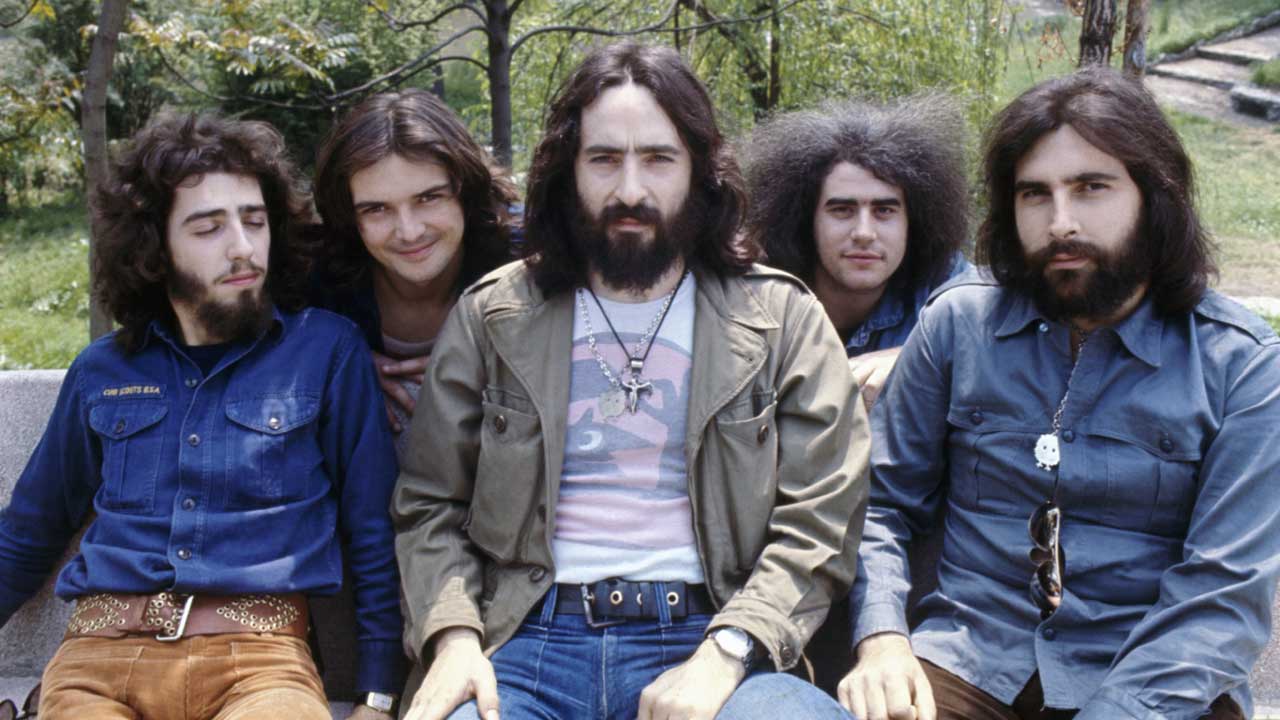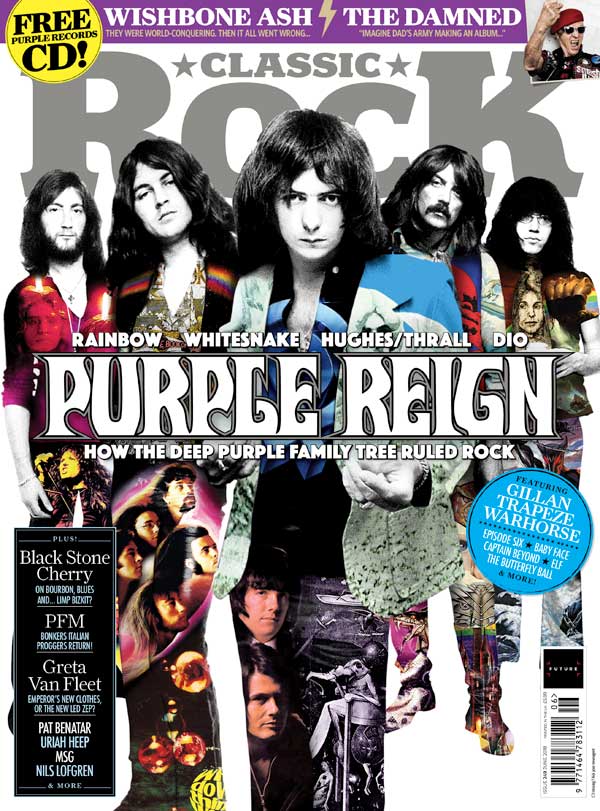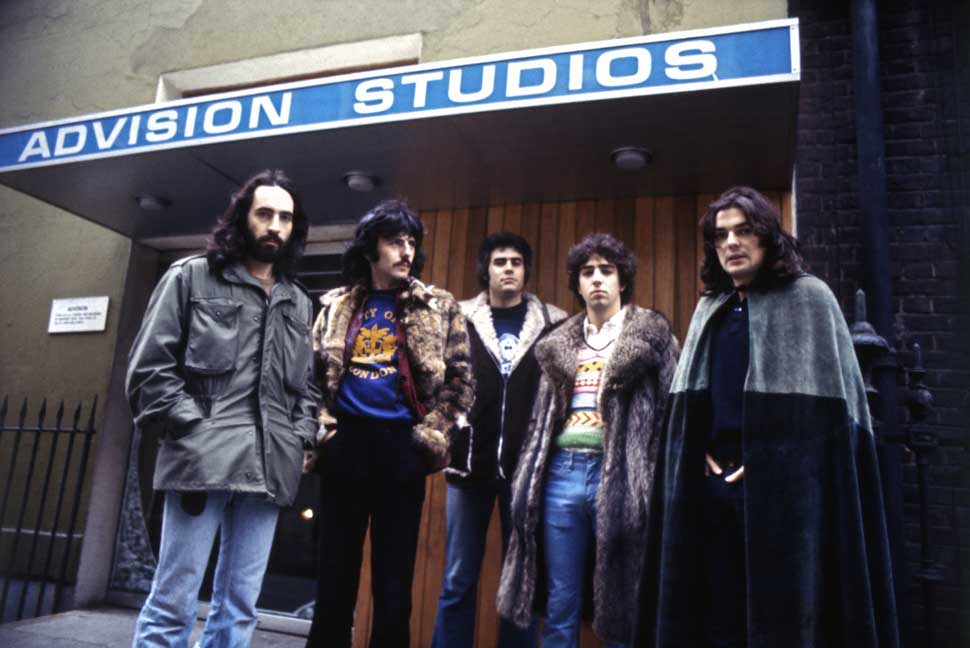"The Queen Mother asked us to play something on the Moog. She was really cute": PFM on brushes with royalty, spaghetti with Aerosmith, and how to annoy America
Premiata Forneria Marconi, aka PFM, remain one of the great trailblazers of European prog rock

Select the newsletters you’d like to receive. Then, add your email to sign up.
You are now subscribed
Your newsletter sign-up was successful
Want to add more newsletters?

Every Friday
Louder
Louder’s weekly newsletter is jam-packed with the team’s personal highlights from the last seven days, including features, breaking news, reviews and tons of juicy exclusives from the world of alternative music.

Every Friday
Classic Rock
The Classic Rock newsletter is an essential read for the discerning rock fan. Every week we bring you the news, reviews and the very best features and interviews from our extensive archive. Written by rock fans for rock fans.

Every Friday
Metal Hammer
For the last four decades Metal Hammer has been the world’s greatest metal magazine. Created by metalheads for metalheads, ‘Hammer takes you behind the scenes, closer to the action, and nearer to the bands that you love the most.

Every Friday
Prog
The Prog newsletter brings you the very best of Prog Magazine and our website, every Friday. We'll deliver you the very latest news from the Prog universe, informative features and archive material from Prog’s impressive vault.
In 2017, Italian progressive rock legends Premiata Forneria Marconi, aka PFM, released Emotional Tattoos, their first album of all-new studio material in over a decade and a return to the 1970s sound that had threatened to make PFM major stars on both sides of the Atlantic. Classic Rock spoke to the band and heard their extraordinary, unlikely story.
Greg Lake was knocked out. Having listened to a cassette of tracks by a band called Premiata Forneria Marconi that he was presented with during Emerson, Lake & Palmer’s tour of Italy, he couldn’t wait to hear more. Back home in London, he phoned their manager, Franco Mamone.
“Greg Lake told him: ‘I can’t believe they can play like this! It’s not possible! Not even King Crimson play 21st Century Schizoid Man the way they do,’” recalls PFM’s drummer and lead vocalist, Franz Di Cioccio. “He said he wanted to see it for himself.”
In December 1972, Lake duly flew over to attend the launch party for Per Un Amico, the group’s second LP, at the PalaEUR in Rome. He even jammed with them on stage during their encore. A few months later, Lake arranged a showcase gig at the ABC Theatre, ELP’s rehearsal space in West London.
“We went over there and they all just loved it,” Di Cioccio recalls. “Greg Lake came up to us when we were finished and told us: ‘We’re doing this new label called Manticore and we’d love you to join us.’ He said that we reminded him of King Crimson, but also loved the fact that we were Italian and put a different edge on things.
"The English music press didn’t know what to make of us. To them, Italy meant opera and Verdi – classical music. They didn’t think Italian bands could play progressive rock. We were the first to come to England and play like that.”
Having signed to Manticore and become known as the more user-friendly PFM, the band were introduced to former King Crimson lyricist Pete Sinfield, then fresh from producing Roxy Music’s debut album. Sinfield set about reinterpreting the bulk of the songs from Per Un Amico with English lyrics. The resulting album, Photos Of Ghosts, released in October 1973, broke PFM on an international scale – they became the first Italian rock act to crack the Billboard album chart in the US.
Sign up below to get the latest from Classic Rock, plus exclusive special offers, direct to your inbox!
PFM hung out with A-list rock stars, courted royalty and packed audiences in wherever they played. They looked set to be huge. But circumstances dictated that instead they became a cult phenomenon, a unique proposition adored by the prog-rock cognoscenti.
“We were different to all the other bands around us,” states Di Cioccio. “Nobody played like we did.”

PFM emerged from the Italian pop scene of the mid-to-late 60s. Di Cioccio, guitarist Franco Mussida, keyboard player Flavio Premoli and bassist Giorgio Piazza had been the Italian equivalent of America’s Wrecking Crew, an elite team of session men who appeared on countless recordings by Italian artists.

By 1968 they’d decided to pool their talents as I Quelli (rough translation: Those Guys), whose sole album included covers of Traffic and The Nice. The arrival of flautist Mauro Pagani in 1970 led to the formation of Premiata Forneria Marconi (translation: Award-winning Marconi Bakery) and a radical new approach.
“The progressive music scene in Italy wasn’t really happening,” Di Cioccio explains. “But there were a lot of bands coming here to tour who had a new way of playing music. And we were the first people to understand that something was changing. Our manager was also the biggest promoter in Italy, so we were the opening act for bands like Deep Purple, Yes, Uriah Heep and Genesis. We used to do covers, but we’d also do our own songs, with a lot of improvisation. We wanted to break with the past, and that was the start of Italian progressive rock.”
Energised by the sounds of King Crimson, Ekseption, Jethro Tull and others, PFM began their own adventures in prog, creating a rich alloy of post-psychedelic rock and traditional classicism. Signed to RCA offshoot Numero Uno, they enjoyed a sizeable Italian hit with their debut single, Impressioni di Settembre. Crucially, it was the first commercially successful song in their home country to feature a synthesiser.
“At the time, the Moog synthesiser was just coming out,” Di Cioccio remembers. “We went to their distributor in Italy and asked if they would give us a Minimoog. We told him that the song was going to be popular and he’d probably sell fifty Minimoogs because of it. So he let us have it. In the end he sold two thousand of them.”
Another key component of PFM’s music was the Mellotron. Its range of sounds, as popularised originally by The Beatles and the Moody Blues, opened up a whole other index of possibilities for PFM, as heard on debut album Storia Di Un Minuto and its follow-up Per Un Amico, both released in ’72
After ELP had signed them up for Manticore, PFM reworked one of Storia Di Un Minuto’s more exuberant moments, È Festa, for inclusion on Photos Of Ghosts as Celebration, a breathless romp of galloping synths and hefty prog, with a brief interlude of woodwinds and strings.
“Celebration comes from an Italian dance, the tarantella,” Di Cioccio explains. “American music tends to come from the blues, whereas we had classical music over here, plus the feeling of Italian music from the south which gives us our sense of melody. Even the way we improvised was different, because we used very little blues language.”
Championed by DJs John Peel and Bob Harris, its impact was enough to secure PFM a spot on that year’s Reading Festival, where they shared a bill that also included Genesis, The Faces and Rory Gallagher. Patrick Djivas replaced Piazza as bassist later in ’73, and they kept the momentum going by recording another album, L’Isola di Niente.
Its English-language companion was The World Became The World (again with lyrics by Sinfield), which broadened their symphonic reach by adding elements of jazz-rock. At its heart was the largely improvised marvel Four Holes In The Ground.
“When he heard that song, Keith Emerson came up to us and said: ‘This is one of the greatest prog songs ever written,’” Djivas recalls. “When songs come from Italian culture, you have to shape them in a way that should be structured inside rock’n’roll. That’s what was special about PFM.”
Eager to capitalise on PFM’s international success, Manticore sent them out on an extensive US tour in the summer of 1974. American audiences thrilled to their intense, jubilant live shows, where they opened for bands including Santana and Aerosmith.
“We played our hottest stuff in concert,” says Djivas. “It was very heavy and the audiences would go crazy. They loved us. They’d be standing on their seats and yelling for an encore. Some bands felt upstaged, though. Our manager took us aside and said: ‘Listen. We should never arrive late and never play one minute more than we’re allowed to. They can’t fire you for kicking their arse every night, but they can fire you for those other things.’ So we were very precise about everything.”
“Santana were fantastic with us,” continues Djivas. “They saw that the audience was going crazy and shouting ‘PFM! PFM!’, so the next night they decided to see for themselves what was happening. And they loved us. They ended up dropping a song from their set so that PFM could do an encore.”
Life on the road wasn’t without its temptations, of course, but PFM tended to avoid the usual trappings of rock’n’roll.
“A lot of the bands would be taking drugs, but our big thing was food,” Djivas says. “The bands we were playing with would often stay at the same hotel, and would come over to our room, attracted by this great smell. We’d be cooking spaghetti, we’d have a little wine and all start singing. Aerosmith used to come to our room every night for spaghetti. Steven Tyler would be singing and laughing all the time. We used to do little theatre pieces in our room, where we did imitations of Elvis Presley and Sha Na Na, and they were having so much fun.
“The two brothers at Atlantic Records, Ahmet and Nesuhi [Ertegun], were big enemies at the time and hadn’t talked to each other in years. But they got together one night on our floor, eating spaghetti with plastic forks and having a good time. And all the other people at Atlantic were freaking out. We had so many times like that. Girls would be going past our room: ‘Hello, is there a party over here?’”
PFM captured their blazing live shows of ’74 on Cook, released later that year. Recorded in Toronto and New York, and topped off with the 15-minute free jam Alta Loma 5 ’Till 9, it was titled Live In U.S.A. for the European market. The press junket for Cook, fittingly, was held at a top restaurant, where 200 invited guests were served risotto and pasta – made by Mussida and Di Cioccio – in the colours of the Italian flag.
Cook did the business in the US charts too, in a year in which PFM played in front of more than 200,000 people at the August Jam in North Carolina, alongside ELP and the Allman Brothers. Indeed, PFM toured the States so frequently that they set up home in LA, either holing up just off the Sunset Strip or staying at celebrated rock hangout the Sunset Marquis.
“There was a party every night,” Di Cioccio remembers. “[Jazz bass player] Jaco Pastorius used to come over after recording with Joni Mitchell during the day. We’d be hanging out with lots of musicians, like Jaco or Frank Zappa. I think they liked PFM because we were different.”
The band’s love affair with the US cooled somewhat following 1975’s Chocolate Kings. Their first studio album without an Italian counterpart, its cover featured a bar of chocolate in a torn wrapper printed with the American flag, the back cover the wrapper scrunched into a ball. The sarcastic connotations of this visual prank were also mirrored in some of the record’s lyrics.
“We had a few problems with it in the States,” Djivas concedes. “They didn’t like it that much, especially with an American flag on the cover. But it depended which side you were on. Many of the kids loved it, because they agreed with the way we used the flag.”
“It was meant to be ironic, not offensive,” adds Di Cioccio.

Suffice to say, sales there took a bump. It was very different in the UK, though. Chocolate Kings made the Top 20, PFM undertook a sell-out tour, and in Melody Maker’s year-end poll, the band came second in the Brightest Hope category, ahead of Supertramp and Eagles. They ended 1975 with a hugely successful string of dates in Japan. In April ’76 they appeared on BBC TV music programme The Old Grey Whistle Test.
“We did a seven-minute version of Celebration,” remembers Djivas. “At the end, [presenter] Bob Harris, who hardly ever made any comments, went: ‘Phew!’ Everyone was talking about it the day after.”
Another unlikely ally came along a month later, when PFM were rehearsing for a headline show at the Royal Albert Hall.
“At a certain point we noticed all this commotion,” says Djivas.
“All the English roadies stopped what they were doing and just stared.” Di Cioccio adds: “We didn’t know what was happening. Then this old lady came on stage and started talking to us. It was the Queen Mother. She said she liked what she’d heard and wanted to know everything: ‘What’s that instrument? What’s this one?’ Then she asked us to play something on the Moog. She was really cute.”
The Queen Mother’s official photographer took a photo of her chatting to Djivas, who was wearing a Gibson T-shirt. “The next day I got a call at my hotel from Gibson,” he recalls. “Because of the Queen Mother connection, they wanted to offer me an endorsement deal with them. So they started giving me plenty of basses and flew me all over the world.”
The influence of the jazz musicians that PFM were hanging out with in LA was keenly felt on their next album, 1977’s Jet Lag. It was a watershed record in several ways.
“We never made records with the idea of trying to sell lots of them,” Djivas explains. “Everybody told us we were really crazy: ‘You’re about to explode in America and you decide to do a jazz album?!’ But we were like: ‘Yeah, this is what we want to do at this moment.’”
Jet Lag also had a wider significance.
“Because we’d done an English version of Chocolate Kings, rather than an Italian one, we knew it would be difficult for the fans back home in Italy to understand the meaning of the songs,” says Di Cioccio. “For us it was about cultural jet lag. We spent part of the year in Los Angeles, so there was always this question about when we would go back.”
Homesickness had also become an issue for several band members. PFM took a democratic decision and returned to Italy. Jet Lag was their last album with lyrics in English.
PFM went on to re-establish themselves in Italy, where they set up their own label, Zoo, before the band members went their separate ways in 1987. There were no serious divisions, just a cordial consensus that each of them needed to try their own things or spend more time at home. As if to underscore the tone of this split, PFM were keen to assert that they never officially disbanded. Mussida opened a jazz academy, others did solo projects, others wrote for TV and film.
PFM reunited a decade later and released a series of live and studio albums, but last year’s Emotional Tattoos is their first all-new album in more than 10 years. What’s more, it marks a return to their 70s heyday, in that it comprises two separate albums: one in Italian, the other in English. It also happens to be a spectacular return to form, with its deliciously wonky time signatures, fluid guitar rhythms, diving keyboard riffs and a celebratory sense of vitality.
There is, too, the odd reference to PFM’s own journey: “La Danza Degli Specchi is the story of PFM in Italian,” explains Di Cioccio, the current band’s sole original member. “We start with the blues and arrive at classical music. When we sing: ‘La musica è potente, è tutto un solo continente,’ it means that the music is everything, it’s powerful.”
In contrast, its English-language equivalent, A Day We Share, is an eco-political hymn that hits a universal nerve. Like most things PFM turn their hand to, it’s evidence that Emotional Tattoos works on a number of different levels. PFM seem to have retained the instincts that made them so spectacular back in their heyday.
Di Cioccio and Djivas continue to steer the seven-piece, now made up of relatively new additions, into bold new territory. This is illustrated beautifully on the front cover of Emotional Tattoos, which depicts the two old-stagers in the cockpit of a new age spaceship, arriving at some fabulous fantasy world full of giant vegetation and winged creatures. “Patrick and me are like Han Solo and Chewbacca in Star Wars!” proclaims Di Cioccio.
Their music might still be too pan-dimensional for less demanding mainstream tastes, but they remain heroes in their own country. Further afield, their legend is assured as one of the great trailblazers of European prog rock.
Currently on an extensive world tour, playing in South America, the US and Europe, PFM are clearly far from finished. “We’re so satisfied right now,” Djivas says. “This album made number one in the Italian charts, and for many years we hadn’t been able to do that. For a band who’ve been going for over forty-five years, it’s truly amazing to be back.”
This feature originally appeared in Classic Rock 249, published in May 2018. PFM released their most recent album, I Dreamed of Electric Sheep - Ho Sognato Pecore Elettriche, in 2021.
Freelance writer for Classic Rock since 2008, and sister title Prog since its inception in 2009. Regular contributor to Uncut magazine for over 20 years. Other clients include Word magazine, Record Collector, The Guardian, Sunday Times, The Telegraph and When Saturday Comes. Alongside Marc Riley, co-presenter of long-running A-Z Of David Bowie podcast. Also appears twice a week on Riley’s BBC6 radio show, rifling through old copies of the NME and Melody Maker in the Parallel Universe slot. Designed Aston Villa’s kit during a previous life as a sportswear designer. Geezer Butler told him he loved the all-black away strip.
You must confirm your public display name before commenting
Please logout and then login again, you will then be prompted to enter your display name.





